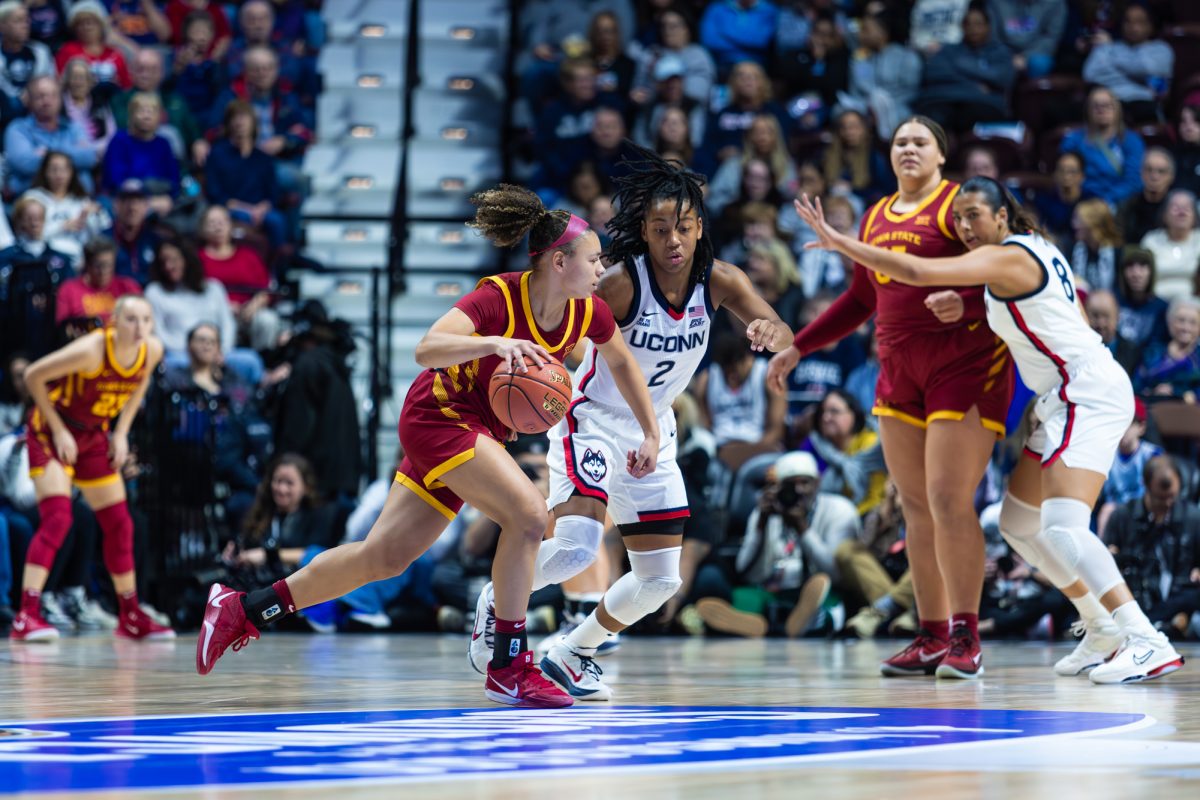The case of the disappearing Cyclones
September 7, 1998
For 38 and-a-half minutes, everything went according to plan.
Todd Badhauer was getting plenty of time in the pocket and, subsequently, was picking the defense apart. He was gelling nicely with his receivers, be they JC transfers, walk-ons, or returning letterwinners.
Darren Davis was well on his way to achieving his fifth 100 yard effort in his Cyclone career.
The defense — my God, the defense was pitching a shutout.
ISU had scored two touchdowns in a row, and the world was their oyster.
Then, before you could say “here we go again,” the Cyclone Curse that has been plaguing the team throughout Dan McCarney’s tenure came up and bit them square on the ass.
The Case of the Disappearing Cyclones can be broken down into three, easy-to-follow exhibits.
Join me, if you dare, and we will explore just how the ‘Clones managed to let another winnable game slip through their fingers.
EXHIBIT A
The first exhibit has to do with the breakdown of the defense on one play in particular.
Let’s review the first touchdown by the TCU offense, a 30 yard TD run by Basil Mitchell.
The quarterback, Patrick Batteaux, rolls left on an option play. Just as he pitches the ball back to Mitchell, he is pummeled by Reggie Hayward, who does his job admirably.
Mitchell then takes the ball, makes a cut, and as two or three Cyclone defenders take a poor angle on the him, saunters into the endzone without being touched.
If you would like detailed descriptions of his next two touchdown runs of 29 and 43 yards, just review the above paragraph.
The plays were exactly the same.
In those three rushes, Mitchell accumulated 102 yards. His totals for the game were 21 carries for 189 yards.
In the process, Mitchell joined a very select group of running backs that includes Devin West of Missouri, Eric Vann of Kansas and Herchell Troutman of Colorado.
What, you may ask, does this ragtag group of runners have in common?
The answer is a simple one: They are people who entered games against ISU viewed as average runners and emerged with a victory in hand, looking like Heisman candidates.
EXHIBIT B
For the second example of the Cyclone collapse, we move to the offensive side of the football.
We will again move to the second half of the game. Specifically, we will move to about ten minutes left in the 4th quarter.
The game is tied at 21, and QB Todd Bandhahuer is having an absolutely stellar outing. At this point, the senior signal-caller is 19-of-31 with 258 yards, 2 TD’s and no interceptions.
Then, the Cyclone Curse hit Bandy.
He finished the game 3-14 with 10 yards, including 2 INT’s.
Although no explanation for the drop-off was provided, it was painfully obvious that Bandhauer was exhausted.
He no longer had zip in his normally lazer-like projections. He was simply not the same player. Which leads us directly to the next exhibit.
EXHIBIT C
Darren Davis undoubtedly holds the key to the Cyclone offense. Everyone saw that last year in the games he missed.
With a solid running game, it was argued, the Cyclones could have ground out the clock and hung onto leads against clubs like Colorado and Minnesota.
And with ten minutes left in the third quarter and ISU having just scored to take the lead for the first time in the game at 14-7, Double D was having a fine day at the office.
He had carried the ball 17 times for 80 yards.
Then came the Curse.
He spent the rest of the afternoon spinning, twisting and turning his way to a total of -11 yards on eight carries.
As with his brother Troy, as Davis goes, so go the Cyclones. Or in this case, so they went — right down the tubes.
No one could find reason for this continuing collapse. Todd Bandhauer seemed to sum up the feelings of the ISU community very well.
“It’s bullshit,” said the frustrated quarterback.
Dan McCarney said that the good thing was that there was still three months of football left.
Coach Mac was correct in that the Cyclones still had ten games and a long time to play. Whether that is a good thing or not is certainly debatable.
Josh Flickinger is a junior in journalism and mass communication from Rockford, Ill.






